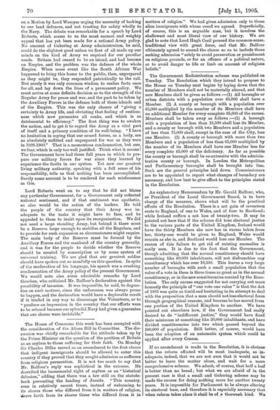An explanatory Memorandum by Mr. Gerald Balfour, who, as President
of the Local Government Board, is to have charge of the measure, shows what will be the practical effects of the Resolution. There is a net gain of seventeen seats to England, of one to Wales, and of four to Scotland; while Ireland suffers a net loss of twenty-two. It may be pointed out here that if the scheme did true electoral justice to the various parts of the United Kingdom, Ireland would have the thirty Members she now has in excess taken from her, thirty-one would be given to England, Wales would remain as she is, and Scotland would lose one Member. The reason of this failure to get rid of existing anomalies is easily seen. It is due to the fact that the Government, though admitting that the normal constituency should have something like 60,000 inhabitants, will not disfranchise any constituency which has over 18,500. This leaves a very large number of boroughs with such a small population that the value of a vote in them is three times as great as in the normal constituency, or in the new constituencies created by the Reso- lution. The only excuse suggested for not carrying out more honestly the principle of "one vote one value" is that the Act of 1885 was quite as timid and hesitating in its attempt to deal with the proposition that a man should not lose electoral force through geographical reasons, and because he has moved from one portion of the United Kingdom to another. We have pointed out elsewhere how, if the Government had really, desired to do "indifferent justice," they would have fixed their minimum at something like 30,000 inhabitants, and have divided constituencies into two which passed beyond the 100,000 of population. Still better, of course, would have been the adoption of an automatic system which could be applied after every Census.






































 Previous page
Previous page